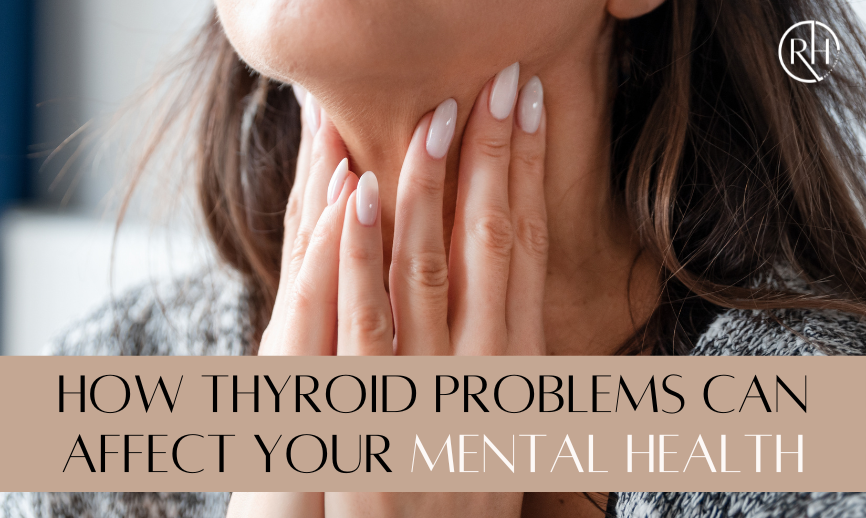How Thyroid Problems Can Affect Your Mental Health
Everybody experiences emotional ups and downs throughout their lives. Under normal circumstances, these shifts are often based on external events, such as the death of a friend, family member, or pet, receiving some good or bad news, or if we are stressed from too much work. Even the weather can affect one’s frame of mind. People’s emotional temperaments are different, as well. Some people have strong emotional reactions, while others have slight ones.
Sometimes emotional states are based on physiological factors. This, too, is normal. Our mental state can be affected by whether we get a good night’s sleep, if we feel ill, or if we are hungry. But sometimes, the physiological factors that impact our mental state are not so obvious. One thing that can dramatically affect our mental health is our hormonal balance.
Thyroid Issues Influence Us Physically and Mentally
Hormones regulate all bodily functions, including growth and development, reproduction, and metabolism. Hormones are produced and released by several glands, such as the pituitary gland, the hypothalamus, and the thyroid gland.
The thyroid gland is located at the base of the neck. The hormones produced by the thyroid primarily regulate metabolism and energy levels. If the thyroid does not produce enough hormones, it is called hypothyroidism; if it produces too many, it is called hyperthyroidism. Both of these conditions can manifest themselves not only physically but psychologically.
Hypothyroidism can manifest itself in several ways. Physically, it may cause:
- Fatigue
- Weight gain
- Dry skin
- Constipation
Mentally, it may manifest itself by
- Depression
- Anxiety
- Irritability
- Difficulty concentrating
- Memory loss
- Low libido
In contrast, hyperthyroidism may cause
- Rapid heart rate
- Sweating
- Nervousness or restlessness
- Insomnia
- Tremors
What Is Normal?
While these symptoms can be experienced even when we do not have a thyroid problem, they are usually short-lived. For example, caffeine, processed foods, sugar, or even fatty foods can affect a person’s mental state. In addition, as we age, some of the changes our bodies manifest are a natural result of aging. And while those “aging” changes are also often tied to hormonal changes, they are not abnormal. The problem comes when we try to determine whether our mental condition is “normal” or results from an actual hormonal imbalance that needs medical attention. The key is often in the degree to which we experience these symptoms.
Different chemicals released by our endocrine glands affect our brains. For example, serotonin, oxytocin, dopamine, and endorphins can make us feel warm and happy. Our hormonal glands automatically release these chemicals due to specific stimuli, such as seeing a little puppy or kitten. When we do not respond appropriately to these types of external stimuli, then something is wrong. In other words, when our mental state is noticeably outside of what is normal and expected, we should investigate whether we have an endocrine disorder.
Depression and fatigue are two of the most common psychological symptoms associated with thyroid disorders. When a person suffers from excessive depression or fatigue, and either they or someone close to them recognizes their state but cannot account for or explain it, it may be a sign that these mental conditions are caused primarily by hormonal factors.
Unfortunately, it is difficult for people suffering from depression to rouse themselves to seek help or make changes, even when they recognize that their mental outlook is abnormal. However, people with thyroid imbalances must obtain help. While depression can lead to poor physical and mental health by dampening motivation to undertake healthful activities, untreated hypothyroidism can lead to more severe outcomes: cognitive impairment, mania, or psychosis.
REVV Health: Revolutionizing the Way We Address Health
Thankfully, there are ways to treat thyroid disorders to bring your hormones back into balance. At REVV Health, we help clients achieve hormonal balance by supplementing with thyroid hormones. We can help clients with thyroid problems and other imbalances within the endocrine system. While our first goal is to address issues that lead to physiological and mental problems, our aim goes further. We help our clients achieve optimal hormonal health to promote their longevity and overall quality of life. For more information about our program, contact REVV Health today.


